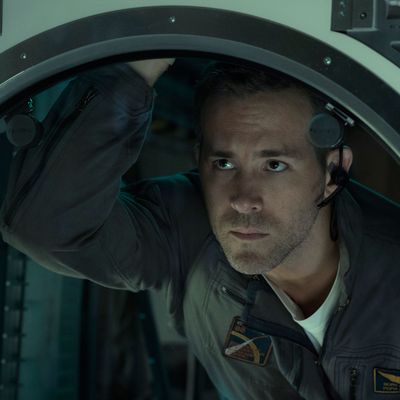
It’s a bit early still, but I’d like to make a prediction: In the tradition of New York and Los Angeles getting engulfed by flame and flood and nuclear winter, the International Space Station is the next outpost of human civilization we’ll see habitually demolished onscreen, over and over again. It got a clobbering from debris in 2014 in Alfonso Cuarón’s Gravity, and it similarly takes a beating in the opening moments of Life. Is the ISS, a multinational research vessel that inspires schoolchildren and promotes cooperation among the scientific community, begging for a cinematic hubris check? If it is, you can bet there will be more to worry about than a little space trash.
Life follows a group of six astronauts aboard the ISS, tasked with examining a rock sample from Mars. Biologist Hugh Derry (Ariyon Bakare) has discovered a dormant single-cell organism in the sample. He manages to wake it up with a little heat and glucose (who among us can resist this combo?) and the world rejoices at the first discovery of extraterrestrial life. We see this primarily via an overhead shot of a packed Times Square — even in the near future, everyone will still descend on midtown to watch television. A group of children are given the opportunity to name the creature, and they name it after their elementary school: “Calvin.” Then Calvin starts growing, first into something resembling a couture pasty designed by H.R. Giger, then into a little floppy, translucent starfish. An analysis of his cellular structure reveals that he is “all muscle, all brain, and all eye.” He’s no bigger than a tennis ball when he crumples Hugh’s hand like a soda can and escapes his box in the lab. From there, he keeps finding food, and growing, and picking off the crew one by one.
Those inclined toward this kind of material will likely hold Life up unfavorably against the first Alien movie, which had a similar structure but better characters and more tactile horrors. But while Alien remains untouchable, and the xenomorphs themselves something out of a nightmare, Calvin — especially in his early, ephemeral, blob stage — is much more like something out of my nightmare. The CGI work is both obviously synthetic and vibrantly gross. In the zero-gravity environment, Calvin’s handiwork resembles the victims suspended in the black void from Jonathan Glazer’s Under the Skin. I already used the word “crumple,” but yes, they’re crumpled.
There’s also the proximity to Earth — as the situation gets more dire, help is so close, yet so far. Even this close to home, no one can hear you scream. It would have been nice to have more character time with Jake Gyllenhaal’s David Jordan, who is nearing the record for consecutive days in space and looks like it. When his colleague Miranda North (Rebecca Ferguson) urges him to return to Earth for a bit, he mumbles, with puppy-dog melancholy, “I like it up here.” Space madness is clearly closing in on him even before the E.T. hijinks commence. Gyllenhaal is in haunted Nightcrawler mode throughout, but is never quite given room in the script to explore the implications of that, other than to set up the dramatic irony of the film’s wicked, if predictable finale.
Life comes to us from a veritable Ryan Reynolds support group: Safe House director Daniel Espinosa and Deadpool writing duo Rhett Reese and Paul Wernick, which makes a certain plot point involving Reynolds’s character pretty amusing. But otherwise, there’s little naughty snark here. There’s also not much insight or art to the direction; it’s Alien for short attention spans, Arrival for non-pacifists, with some remnant of ambition toward something headier. On that count, it falls short, but as a final-girl structured horror film, it has plenty of imaginative moments.
Whats most effective, and telling, is how levelheadedly our egghead protagonists handle the alien threat. “Calvin doesn’t hate us,” Hugh says. “He has to kill us in order to survive.” Later, the crew changes its tune: Before the final showdown, one survivor remarks, “I know it’s not scientific, but I feel pure fucking hatred for that thing.” Well, all right. None of this was ever going to be scientific, but it was nice of Life to pretend for a bit.

